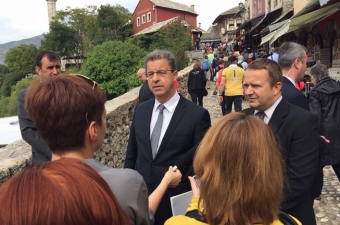Prosecutor Serge Brammertz of the International Criminal Tribunal for the former Yugoslavia today visited the UNESCO World Heritage Site of the Stari Most and the Old City of Mostar, together with UNESCO Head of Sarajevo Office Mr. Siniša Šešum and the Mayor of Mostar Mr. Ljubo Bešlić.
The Stari Most and Old City of Mostar have been recognized by UNESCO as an exceptional and universal symbol of coexistence of communities from diverse cultural, ethnic and religious backgrounds. During the 1992-1995 armed conflict in Bosnia and Herzegovina, the city of Mostar was divided and besieged for nine months. Widespread crimes were committed against the civilian population, including ethnic persecution. On 9 November 1993, the Stari Most was intentionally shelled and destroyed.
Prosecutor Brammertz praised UNESCO, the World Bank, the Aga Khan Trust for Culture, the World Monuments Fund and the City of Mostar for the successful reconstruction of the Stari Most and historic city center of Mostar. “As this reconstruction shows, extremists cannot erase from history our common heritage of diversity, co-existence, and religious pluralism,” Prosecutor Brammertz remarked.
Recognizing the recent attacks by Daesh against important cultural heritage sites and religious institutions in Syria and Iraq, which have been strongly condemned by UNESCO Director-General Irina Bokova and the international community, Prosecutor Brammertz also underscored the importance of accountability for crimes against cultural heritage. The ICTY Office of the Prosecutor prosecuted senior civilian and military leaders for the destruction of numerous cultural, educational and religious institutions during the conflicts in the former Yugoslavia, including the destruction of the Stari Most. As Prosecutor Brammertz emphasized, “Attacks against cultural monuments and institutions are war crimes, and often part of broader ethnic cleansing campaigns. To protect our common heritage, the perpetrators must be held accountable.”


